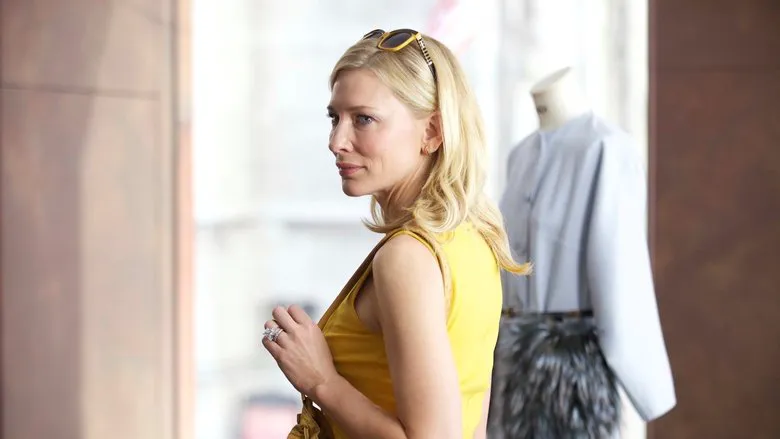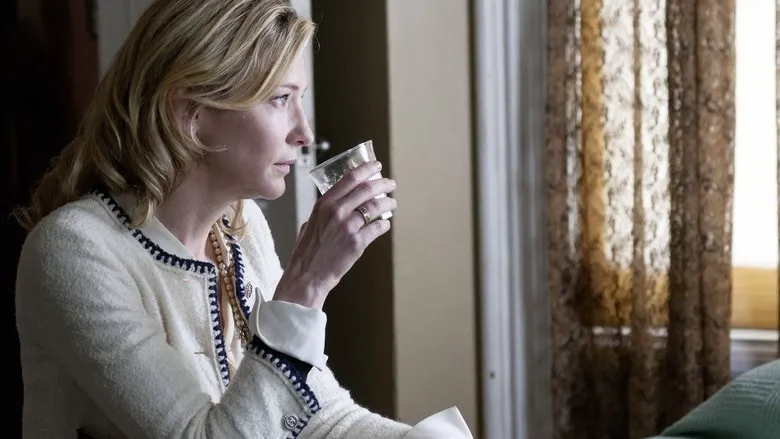Jasmine French (Cate Blanchett) dropped out of college to marry financier Hal (Alec Baldwin). Years later, her idyllic family life crumbles into disaster. Hal is imprisoned for fraud and hangs himself out of shame, while the French family’s assets are seized to compensate victims and the state. After selling her jewelry and squandering her remaining money, Jasmine moves in with her adoptive sister Ginger (Sally Hawkins), who lives in San Francisco, works at a grocery store, and raises two children. Despite lacking education or means, Jasmine considers herself superior to her sister and constantly pesters her with unsolicited advice. Simultaneously, she seeks a man who can restore her to a world of furs and Versace.

Blanche DuBois’ character was partly inspired by Tennessee Williams’ sister, Rose Williams, who spent most of her adult life in a mental institution.
Woody Allen is one of those anecdotal figures who catches a cold at someone else’s funeral. He has never appeared full of life and health, yet he turns 78 this year and still makes a film a year, sometimes setting ambitious artistic goals for himself rather than settling for lighthearted romantic productions like last year’s “To Rome with Love.” This year, Allen offers us a loose and modernized adaptation of Tennessee Williams’ brilliant play “A Streetcar Named Desire.” Although Williams’ name isn’t in the credits of “Blue Jasmine,” the similarities between the film and “Streetcar” are numerous and obvious. One can only wonder why one classic didn’t give credit to the other.

Just as Elia Kazan cast foreign actresses—an Englishwoman and an Australian—to play the quintessentially American leads in “A Streetcar Named Desire,” so too does Woody Allen in “Blue Jasmine.”
Blue Jasmine: A Modern Retelling of a Classic?
Perhaps it’s because “Blue Jasmine” is clearly weaker than “Streetcar”? Tennessee Williams is not William Shakespeare, whose best works easily adapt to different eras. Written in 1947, “Streetcar” is steeped in a sense of place, time, and local culture, and it begins to fall apart when you change even minor details. For example, Williams’ protagonist, Southern aristocrat Blanche DuBois, doesn’t always behave impeccably, but she can always count on the audience’s sympathy because, like Ranevskaya from “The Cherry Orchard,” she was born and raised for a different life than the one she has to lead. In contrast, Jasmine, a woman from modern America and an ordinary family, is a snob without mitigating circumstances. Her illusions are the result not of upbringing but of deliberate self-deception, and therefore she evokes not so much pity as schadenfreude. As in Krylov’s fable: “Now go and dance!” Didn’t get an education or profession? Didn’t open a secret account hidden from the tax authorities? Didn’t learn how to manage money wisely? Didn’t come up with a backup plan in case of infidelity or bankruptcy? Didn’t master a computer, browser, and the Internet? Should have thought about it earlier! After all, how much free time there was, how many unused opportunities…
Comparing “Blue Jasmine” to “A Streetcar Named Desire”
When you start comparing “Blue Jasmine” to the benchmark adaptation of “Streetcar,” filmed in 1951 by Elia Kazan and starring Vivien Leigh, Marlon Brando, and Kim Hunter, Allen loses on every count. A powerful, multi-layered, tense tragedy in the hands of the creator of “Annie Hall” turns into something simplified, petty, drawn-out, and permeated with animosity towards both sisters and their former and current surroundings. True, it’s not a disaster. There is enough of the original in the film to pull the production to a decent level, and Allen has an effective weapon in the arsenal named Cate Blanchett. The actress, who recently portrayed Blanche on stage, convincingly plays a woman on the verge and beyond a nervous breakdown, and her mental pain literally oozes from the screen, impressing those viewers who come to the cinema for the sake of someone else’s grief.
Final Verdict: Worth Watching?
If you are looking for a melancholic drama without a happy ending and with good acting, telling about how easy it is to fall and how difficult it is to rise, “Blue Jasmine” is your film. If you need something deeper, more complex, and more humane, watch or rewatch Kazan’s film. It’s worth it. Even though the director, for censorship reasons, had to smooth out some of the sharp edges of the play, which was extreme for its time.